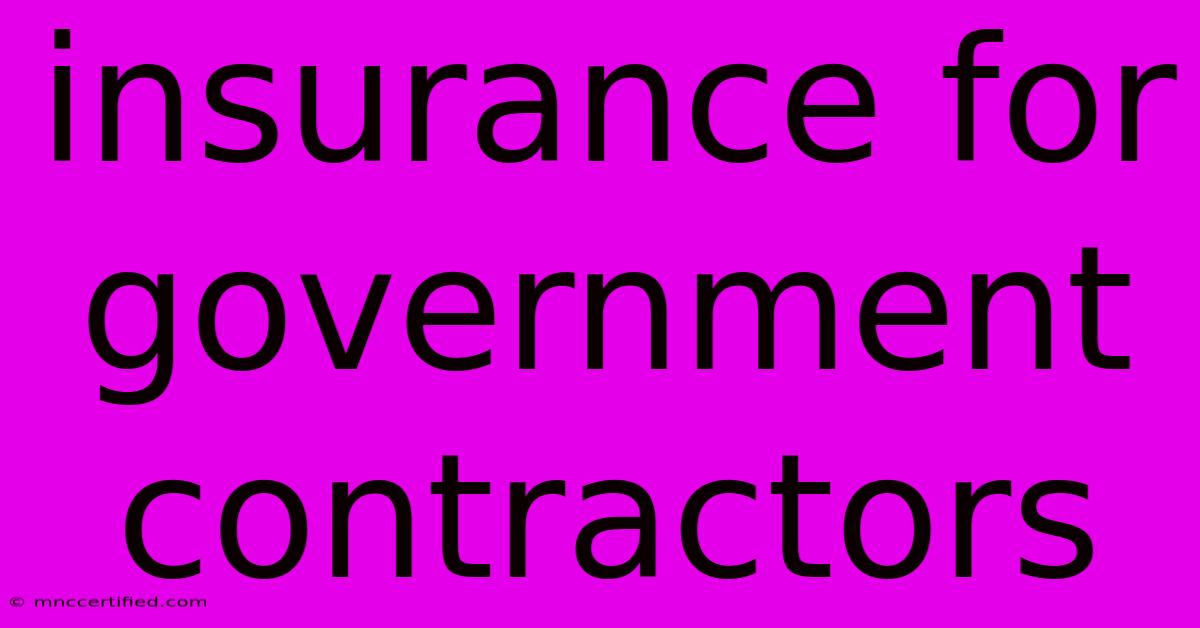Insurance For Government Contractors

Table of Contents
Navigating the Complex World of Insurance for Government Contractors
Government contracts offer lucrative opportunities, but they also come with unique risks and regulatory requirements. To ensure your business is adequately protected, understanding the specific insurance needs of government contractors is paramount. This article will guide you through the essential insurance policies and considerations for government contractors, empowering you to operate with confidence.
Understanding the Need for Specialized Insurance
Government contracts often demand comprehensive insurance coverage to safeguard both the contractor and the government. This is due to several factors:
- High-Value Projects: Government projects often involve significant investments, necessitating robust insurance to cover potential losses.
- Strict Compliance Requirements: Government agencies impose stringent regulations, including mandatory insurance coverage, to mitigate risks and ensure project success.
- Potential for Legal Liability: Contractors face potential liability for various risks, such as accidents, injuries, and environmental damage, requiring comprehensive insurance to protect against financial repercussions.
Key Insurance Policies for Government Contractors
Here are the essential insurance policies for government contractors:
1. Commercial General Liability (CGL) Insurance:
This is a foundational policy that provides protection against third-party claims for bodily injury, property damage, and personal injury arising from your business operations. It's a critical requirement for most government contracts.
2. Workers' Compensation Insurance:
This policy covers employees' medical expenses and lost wages in case of work-related injuries or illnesses. It's mandatory in most states and ensures compliance with government regulations.
3. Umbrella Liability Insurance:
Acting as an additional layer of coverage, umbrella liability insurance extends protection beyond the limits of your CGL policy. It's crucial for handling large-scale claims or events exceeding the coverage limits of your primary policies.
4. Builder's Risk Insurance:
This policy covers physical damage to your project during construction or renovation, providing peace of mind against unexpected events like fire, theft, or natural disasters.
5. Surety Bonds:
Government contracts frequently require surety bonds, which guarantee the contractor's performance and financial responsibility. These bonds protect the government from financial losses if the contractor defaults on its obligations.
6. Cyber Liability Insurance:
In today's digital age, cybersecurity is crucial. Cyber liability insurance protects your business against data breaches, cyberattacks, and related financial losses. It's essential for government contractors who handle sensitive data.
7. Environmental Liability Insurance:
Contractors operating in environmental-sensitive areas may require environmental liability insurance. It safeguards against claims arising from pollution, contamination, or environmental damage.
Navigating Insurance Requirements
Government contracts outline specific insurance requirements. Carefully review the contract documents and ensure compliance with:
- Policy Limits: The contract may stipulate minimum coverage limits for various insurance policies.
- Insurers: Some contracts might specify approved insurance carriers.
- Endorsements: Certain endorsements might be required to fulfill specific contract terms.
Additional Tips for Government Contractors
- Consult with an Insurance Broker: A specialized insurance broker can help you understand the specific needs of your business and navigate the complex world of government contract insurance.
- Seek Advice from Legal Counsel: Consult with legal professionals familiar with government contracting to understand the legal implications of insurance requirements.
- Maintain Adequate Documentation: Keep accurate records of your insurance policies, endorsements, and proof of coverage for compliance purposes.
By understanding the specific insurance needs of government contractors, you can mitigate risks, ensure compliance with regulations, and operate with confidence. Invest in the appropriate insurance coverage and consult with industry experts to create a comprehensive risk management strategy for your business.

Thank you for visiting our website wich cover about Insurance For Government Contractors. We hope the information provided has been useful to you. Feel free to contact us if you have any questions or need further assistance. See you next time and dont miss to bookmark.
Featured Posts
-
Barcelonas Attack Hit Yamal Lewandowski Out
Nov 12, 2024
-
Manchester United Appoints New Manager Amorim
Nov 12, 2024
-
Manchester United Announces Van Nistelrooy Departure
Nov 12, 2024
-
Kevin Costners Fate In Yellowstone Premiere
Nov 12, 2024
-
2nd Chance Bail Bonds Fulton County
Nov 12, 2024